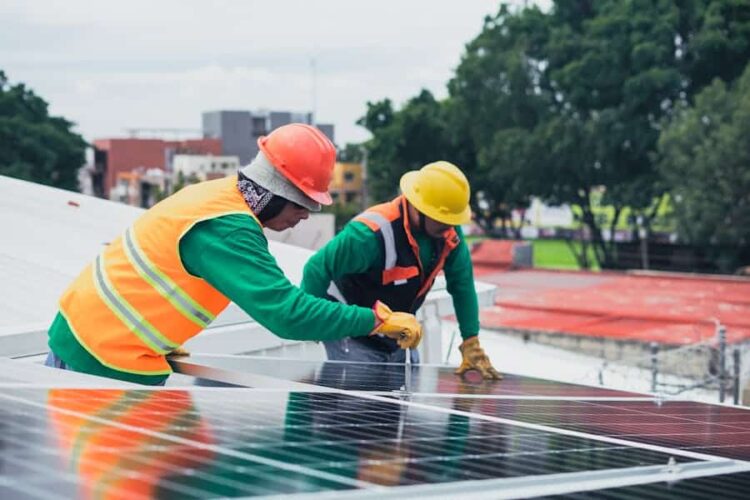Installing solar panels is an excellent choice for homeowners eager to decrease their electricity bills over time and opt for sustainable energy sources. Going with professional solar companies to simplify the solar panel installation process is always a good idea. However, you need to make sure that the solar installers have the licensing and permits required for your solar project.
Solar zoning laws and permit requirements vary depending on your location. In some states, residential and commercial solar licensing and permits can be expensive and imply thorough property inspection. However, some cities have simplified and standardized solar panel regulations.
This article will review permits and solar panel zoning regulations that can influence solar panel installation costs in your area. Keep reading to find out more.
Solar Panels Permits Explained
Potential solar panel system owners should not take solar panel installation lightly. While using solar panels for homes reduces energy bills and impacts property value, it also changes home insurance coverage.
In addition, the solar panel installation process involves construction and electrical labor. The existing solar panel laws, electrical and building codes, and local zoning laws aim to ensure the safety of this type of work. Obtaining solar permits through Authorities Having Jurisdiction (AHJ) is crucial for a successful solar project.
Receiving the necessary solar panel installation permits can be time-consuming because of specific bureaucratic procedures. However, it is vital since it ensures your property is safe for solar panels and that a solar panel system is mounted correctly. Fortunately, solar installers can help you reduce the soft solar panels costs and save time by filling out and submitting the needed forms.
Some homeowners choose to install solar panels by themselves. In this case, they become responsible for obtaining the necessary solar panel installation permits. The first step is to determine solar panel permits in the given location. Local solar panel laws are usually available online. If not, potential solar panel owners can specify them by contacting the local authorities office.
Types of Solar Panels Permitting
To license your solar panel system, you must ensure it can be safely connected to the local power grid. Additionally, you should contact your city planning department to double-check if a solar array project complies with electrical and building codes.
Here are two types of permits you should receive.
Structural Permit
To avoid any legal issues in the future, your solar panels for home usage must adhere to the rules and regulations for U.S. construction projects. Verifying that your solar project meets fire safety provisions and structural requirements is essential.
Solar panel installation design must be compliant with the National Electric Code. Solar panel regulations and codes can vary from state to state and receive annual updates. That’s why, in many states, local authorities prohibit DIY solar panels for homes and allow only professional certified solar companies.
Interconnection Permit
The next step in the solar panel installation process is to obtain permission to connect your solar array system to a local commercial grid.
The providers are typically interested in the following details about your solar:
- The quantity and specifications of your solar panels and other solar equipment
- The desired location of the solar panel system
- Your solar inverter and solar panel capacity
Do You Need an Inspection Before Solar Panel Installation?
Though home inspections are not a surprise for those who bought a new property, only a few know about solar array inspection procedures. Many cities and towns provide a solar system inspection after the solar panel installation process.
Why is it important to have a home inspection before you buy solar power?
During the inspections conducted at residential and commercial properties, the officials ensure no code violations occur. They also check if the system matches the solar project design previously submitted with the permit.
Potential solar panel owners need to know what regulations they must adhere to.
On the other hand, officials must complete the final inspection and grant the utility company interconnection approval before installing solar panels.
What Are Solar Zoning Laws?
Solar zoning laws vary from state to state and serve as a guide for the zoning review of solar installation projects. Solar panel zoning makes the system design requirements transparent for solar companies. This policy framework determines the central zoning districts and identifies solar panel system configuration types.
Depending on the district, the solar panel zoning regulations may impact solar projects and restrict available design features of proposed systems. Thus, specific design requirements can affect solar panel size and dimensions. That’s why staying up-to-date on the most recent legal information regarding solar array installation for residential and commercial properties is important.
Setbacks and Height Limitations for Solar Panels
If you decide to go solar, you should know the height and setback requirements for solar panel installation in urban areas. Solar panel roof systems blend into the house structure, making calculating a building’s maximum height necessary. Solar array systems approaching the maximum allowable height may not be granted permits required in many cases.
Developers wanting to install solar panels on the rooftops should consider reducing the overall height of the interior space. Although this may make the square footage of the building smaller, such improvements can help make room for the solar panels.
Solar Panel Zoning Regulations Best Practices
Local authorities can help reduce the soft costs associated with solar panel installation by adopting local zoning ordinances and laws that support solar energy deployment. The essential part of such practices is identifying and eliminating barriers to solar energy adoption by a community.
Review some of the best practices for implementing solar panel laws in local communities.
No Solar Panel Zoning Review
One of the ways to optimize the adoption of small-scale solar panel projects is to allow small rooftop solar panel installations to be mounted without a particular zoning review. It helps minimize staff review time and will enable developers to obtain a building permit without an inspection.
Solar Panels Visibility
Though hiding solar panel systems can be suitable for aesthetic reasons, removing solar arrays from public view adds extra costs and can cause shading. Unless we talk about historic buildings, such a requirement can only discourage solar installations and bear no practical implications.Best practices include making solar panels for homes visible. Many zoning codes exempt rooftop solar panel systems from the rooftop mechanical equipment screening requirements.
Solar-Friendly Design Incentives
Local governments may consider contributing to solar panel financing by providing solar rebates and incentives for solar-friendly building designs. It can include density bonuses, waiving permit fees, or reducing minimum parking requirements.
Ground-Mounted Solar Panel Systems
Another way to expand a local solar panel market is to allow for small, ground-mounted, and primary-use installations by establishing regulatory pathways for both. A shared solar panel installation can decrease the cost of solar energy adoption for residential or commercial purposes.
Many cities that are pioneers in solar energy adoption support the idea of larger solar panel systems. It helps them meet community goals of economic development.
Wrapping Up
To sum up, potential solar panel system owners should investigate what solar panel laws and regulations are needed to mount a solar system on their property. Solar panel requirements are different depending on your location.
Local zoning laws can set certain limitations and requirements for your solar panel project. Carefully navigating these solar panel zoning regulations allows you to adopt technology to meet your energy demands and pave the way toward a greener future.










